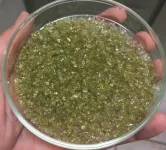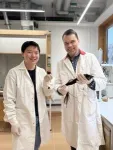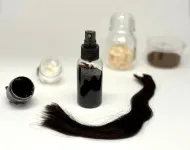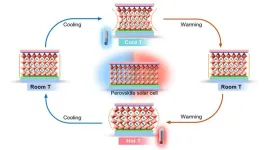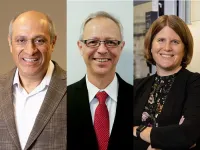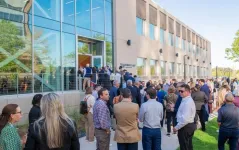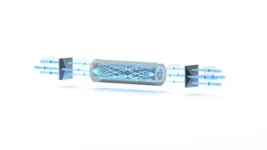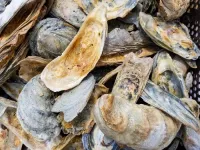(Press-News.org) Agricultural fertilizers are critical for feeding the world’s population, restoring soil fertility and sustaining crops. Excessive and inefficient use of those resources can present an environmental threat, contaminating waterways and generating greenhouse gases such as nitrous oxide. Now, researchers reporting in ACS Agricultural Science & Technology have addressed those challenges with glass fertilizer beads. The beads control nutrient release, and the researchers say they’re environmentally compatible.
“The results show that glass fertilizers can be tailored to plant needs, slowly and sustainably releasing nutrients to boost productivity without harming soil quality,” says Danilo Manzani, a co-author of the study.
Over time, the use of agricultural chemicals has increased. In 2020, the Food and Agriculture Organization of the United Nations estimated that global demand for fertilizers would surpass 200 million metric tonnes. Fertilizers contain nitrogen, phosphorus and lower amounts of other elements like calcium. Unfortunately, the benefits of these nutrients are lost through leaching into groundwater and emissions into the air, necessitating frequent reapplication and creating downstream environmental problems like toxic algal blooms. A potential solution could come from tiny glass beads that previous researchers used to improve plant growth. To improve the efficiency of nutrient delivery, Manzani, Eduardo Ferreira and colleagues developed a water-soluble, multicomponent glass fertilizer designed for controlled nutrient release.
The researchers synthesized glass consisting of several micro- and macronutrients, such as phosphorus, potassium and calcium. They ground the glass into small (less than 0.85 millimeters wide) and large (0.85 to 2 millimeters wide) particles. In an initial test, the particles were added to either water or a buffer solution that mimicked soil conditions. They found that each nutrient released from both sizes of glass particles and diffused into the solutions steadily over 100 hours with minor fluctuations.
They then applied a nutrient solution or different amounts of the glass beads to soil seeded with a typical lawn and fairway grass, and they compared the plants’ growth in the two treatments. The nutrient solution, which was applied only once, immediately stimulated plant growth, but the effect quickly diminished. However, the single application of glass fertilizer sustained plant growth regardless of particle size, though overall growth depended on the bead dose.
Manzani, Ferreira and colleagues also examined the possible ecotoxicity of the glass fertilizer by exposing lettuce and onion seeds to the beads. Seeds exposed to glass fertilizer had roughly the same germination rate and cell health as those never exposed or those treated with soluble nutrients. The researchers say that these results indicate an efficient and sustained alternative to conventional fertilizers with lower environmental impact.
The authors acknowledge funding from the São Paulo Research Foundation; Center for Research, Technology, and Education in Vitreous Materials; National Council for Scientific and Technological Development (Conselho Nacional de Desenvolvimento Científico e Tecnológico); Coordination for the Improvement of Higher Education Personnel; and Funding Authority for Studies and Projects.
###
The American Chemical Society (ACS) is a nonprofit organization founded in 1876 and chartered by the U.S. Congress. ACS is committed to improving all lives through the transforming power of chemistry. Its mission is to advance scientific knowledge, empower a global community and champion scientific integrity, and its vision is a world built on science. The Society is a global leader in promoting excellence in science education and providing access to chemistry-related information and research through its multiple research solutions, peer-reviewed journals, scientific conferences, e-books and weekly news periodical Chemical & Engineering News. ACS journals are among the most cited, most trusted and most read within the scientific literature; however, ACS itself does not conduct chemical research. As a leader in scientific information solutions, its CAS division partners with global innovators to accelerate breakthroughs by curating, connecting and analyzing the world’s scientific knowledge. ACS’ main offices are in Washington, D.C., and Columbus, Ohio.
Registered journalists can subscribe to the ACS journalist news portal on EurekAlert! to access embargoed and public science press releases. For media inquiries, contact newsroom@acs.org.
Note: ACS does not conduct research but publishes and publicizes peer-reviewed scientific studies.
Follow us: Facebook | LinkedIn | Instagram
END
Researchers at Stockholm University have developed a fully biobased hair conditioner using lignin gel emulsions, offering a sustainable and environmentally friendly alternative to conventional haircare products.
Hair conditioners typically contain 20–30 ingredients, many derived from petroleum and oleochemicals, raising concerns about sustainability and environmental impact. A new study published in Science Advances, demonstrates that micellar lignin gels can effectively stabilize emulsions with natural oils, reducing the need for synthetic surfactants and complex stabilizers commonly used in commercial formulations. The research team, led by Mika Sipponen at Stockholm University, ...
Perovskite solar cells are highly efficient and low cost in production. However, they still lack stability over the decades under real weather conditions. An international research collaboration led by Prof. Antonio Abate has now published a perspective on this topic in the journal Nature Reviews Materials. They explored the effects of multiple thermal cycles on microstructures and interactions between different layers of perovskite solar cells. They conclude that thermal stress is the decisive factor in the degradation of metal-halide perovskites. Based on this, they derive the most promising strategies to increase the long-term stability of perovskite solar cells.
Perovskites ...
University of Houston professors Birol Dindoruk, Megan Robertson and Francisco Robles Hernandez have joined the prestigious list of Senior Members of the National Academy of Inventors.
The University of Houston now has 39 faculty members in the NAI.
“We congratulate these three esteemed colleagues on being named NAI Senior Members,” said Ramanan Krishnamoorti, vice president for energy and innovation at UH. “This recognition is a testament to their dedication, research excellence and pursuit of real-world impact by knowledge and technologies. Their achievements continue to elevate the University as a leader in innovation and entrepreneurship.”
NAI Senior Members ...
Only two blue whale births have ever been recorded in human history, both decades ago. This remains an extraordinary mystery given there used to be hundreds of thousands of blue whales before whaling started — even today blue whales number around 10,000 to 25,000 — and they give birth every two to three years.
Not only are births very stealthy, but calves are also only rarely sighted — far less than would be expected from their pregnancy rates. Calves closely follow their moms and are sighted as mother-calf pairs, but why are so few detected?
A new University ...
The University of Texas at Arlington is joining forces with the Texas A&M Engineering Experiment Station (TEES) to operate the new National Center for Therapeutics Manufacturing Satellite Campus at Pegasus Park (NCTM2) in Dallas.
UTA’s Institute of Biomanufacturing and Precision Medicine (IMPRINT) is partnering with TEES on NCTM2, an extension of the National Center for Therapeutics Manufacturing (NCTM) in College Station. The collaboration will expand UTA’s biomanufacturing capabilities and provide NCTM2 with access to financial ...
Kennesaw State University researcher Chen Zhao has earned the 2025 American Heart Association Institutional Research Enhancement Award (AIREA) for his unique research on non-invasive blood flow prediction in cardiovascular disease diagnosis.
The $194,032 award will allow Zhao to continue developing technology aimed at evaluating Fractional Flow Reserve (FFR), a measurement used to diagnose coronary artery disease (CAD). According to the Centers for Disease Control and Prevention, CAD is the leading cause of death in the United States, with an average of 375,000 to ...
Researchers of photonics from Tampere University, Finland, and Kastler-Brossel Laboratory, France, have demonstrated how self-imaging of light, a phenomenon known for nearly two centuries, can be applied to cylindrical systems, facilitating unprecedented control of light’s structure with great potential for advanced optical communication systems. In addition, a new type of space-time duality is explored for powerful analogies bridging different fields of optics.
In 1836, Henry F. Talbot performed an experiment, where ...
Virginia has made significant investments in the restoration of oyster reefs in the Chesapeake Bay, and now a study led by William & Mary’s Batten School & VIMS suggests those management practices are literally paying off in the Rappahannock River. The study, recently published in the Journal of Environmental Management, was led by Batten School of Coastal & Marine Sciences Ph.D. student Alexandria Marquardt, who presented the results to the Virginia Marine Resources Commission’s (VMRC) Shellfish Management Advisory Committee ...
Do you see the glass as half empty or half full? If you rewind to the start of the COVID-19 pandemic, chances are you experienced some level of pessimism. And who could blame you? With social isolation, health concerns and economic uncertainty, fear and anxiety became a daily reality for many.
A team of researchers from Syracuse University and Michigan State University recently explored the personal characteristics that help people handle prolonged stressors, such as the pandemic. Led by Jeewon Oh, assistant professor of psychology in Syracuse University’s College ...
The targeted treatment of brain diseases such as Alzheimer’s, Parkinson’s or brain tumours is challenging because the brain is a particularly sensitive organ that is well protected. That’s why researchers are working on ways of delivering drugs to the brain precisely, via the bloodstream. The aim is to overcome the blood-brain barrier which normally only allows certain nutrients and oxygen to pass through.
Microbubbles that react to ultrasound are a particularly promising method for this sort of ...
